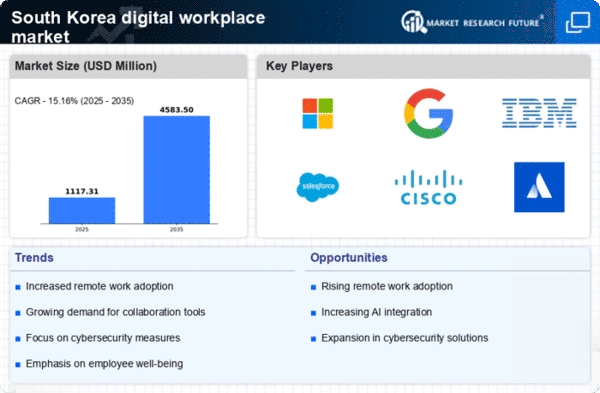Integration of Cloud-Based Solutions
The integration of cloud-based solutions is a key driver in the digital workplace market in South Korea. As businesses seek to enhance flexibility and scalability, cloud technologies are becoming essential. Current estimates suggest that over 65% of South Korean enterprises have adopted cloud services to support their digital operations. This trend is reshaping the digital workplace market, as organizations leverage cloud solutions for data storage, collaboration, and application deployment. The ability to access information from anywhere fosters a more agile work environment, which is increasingly vital in today's fast-paced business landscape.
Emphasis on Data Security and Compliance
Data security and compliance are critical drivers in the digital workplace market in South Korea. With the rise of digital transformation, organizations are prioritizing the protection of sensitive information. Recent statistics indicate that approximately 75% of South Korean companies are investing in cybersecurity measures to safeguard their digital assets. This heightened focus on security is shaping the digital workplace market, as businesses seek solutions that not only enhance productivity but also ensure compliance with local regulations. The demand for secure digital environments is likely to continue growing, influencing market dynamics.
Growing Demand for Remote Work Solutions
The digital workplace market in South Korea is witnessing a growing demand for remote work solutions. With an increasing number of organizations adopting flexible work arrangements, the need for robust digital infrastructure has become paramount. Recent data indicates that around 60% of South Korean employees prefer hybrid work models, prompting companies to invest in digital tools that facilitate remote collaboration. This trend is driving the digital workplace market to expand, as businesses prioritize solutions that support seamless communication and project management, ultimately enhancing overall operational efficiency.
Focus on Employee Training and Development
In South Korea, the digital workplace market is significantly influenced by a focus on employee training and development. Organizations are increasingly recognizing the importance of equipping their workforce with the necessary skills to navigate digital tools effectively. As of 2025, about 55% of companies have implemented training programs aimed at enhancing digital literacy among employees. This emphasis on continuous learning not only boosts employee morale but also contributes to the overall growth of the digital workplace market, as skilled employees are better positioned to leverage digital tools for improved productivity.
Technological Advancements in Communication
The digital workplace market in South Korea is experiencing a surge due to rapid technological advancements in communication tools. Innovations such as AI-driven chatbots, video conferencing platforms, and real-time collaboration software are transforming how organizations operate. As of 2025, approximately 70% of companies in South Korea have integrated advanced communication technologies into their workflows. This shift not only enhances productivity but also fosters a more connected workforce. The digital workplace market is thus benefiting from these advancements, as businesses seek to streamline operations and improve employee engagement through effective communication solutions.
















